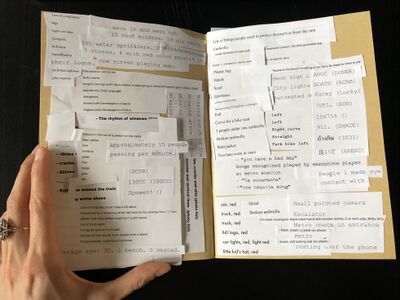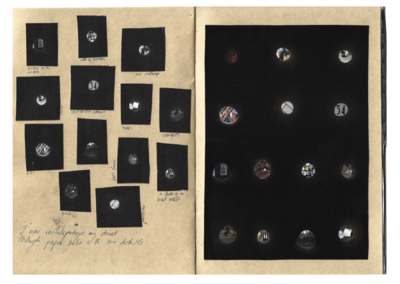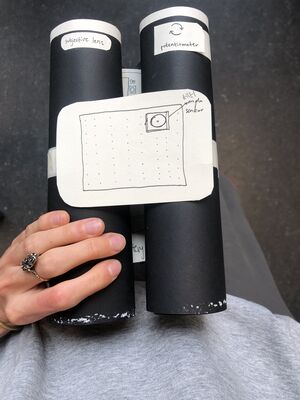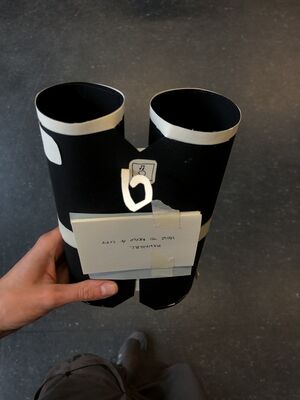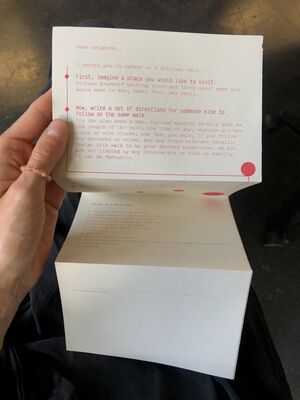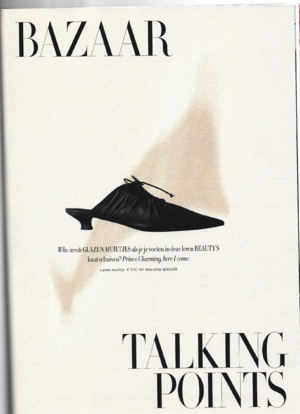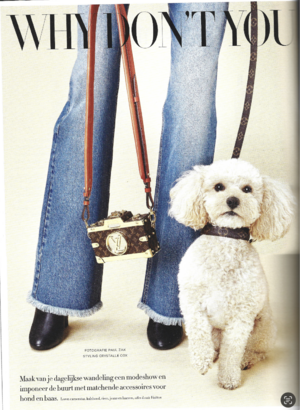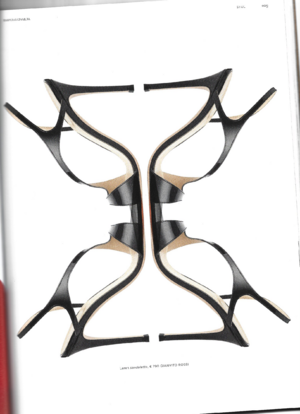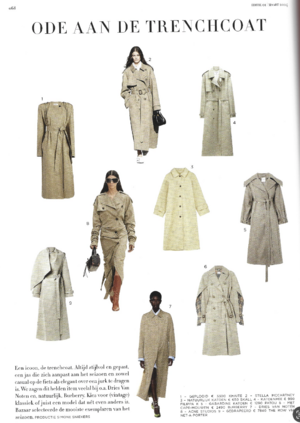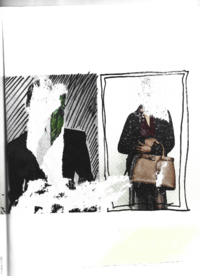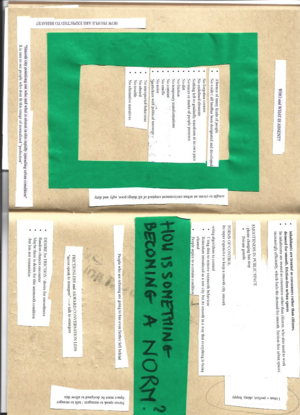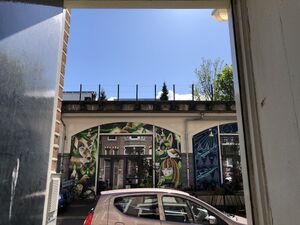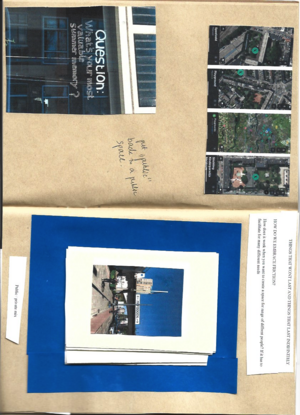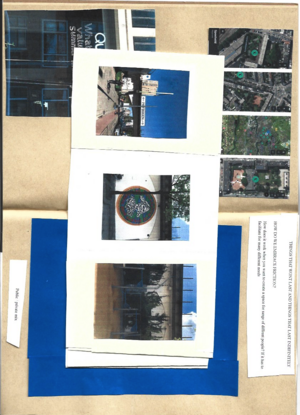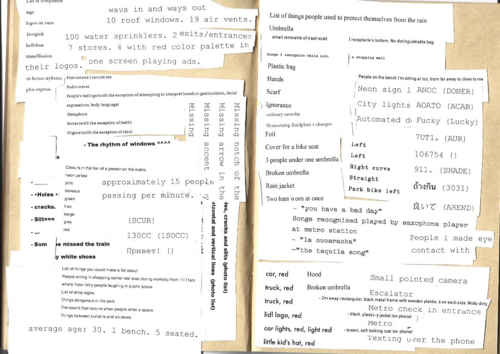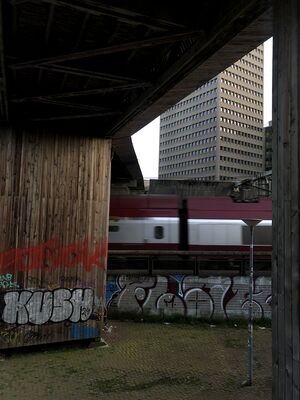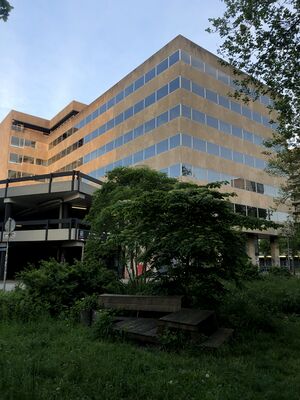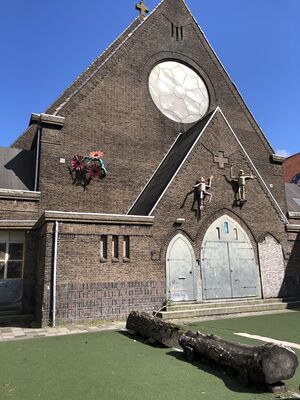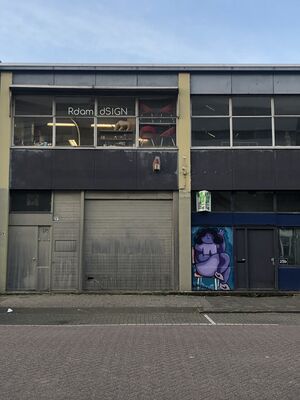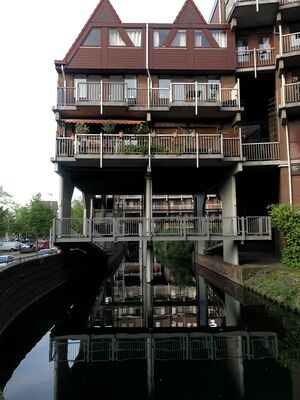User:Mania/Special Issue 24
Loitering
A proposal to observe and engage with the city in its shifting technological and social contexts, by spending time in public and semi-private spaces, finding ways to execute digital and performative scripts, encountering inhabitants and other forms of life, interacting with ubiquitous computing in the wild.
The proposal then is to find appropriate spots to loiter in and around Rotterdam, spend some time in company of its networks and its inhabitants, and find suitable ways to develop, execute and alter scripts for the public space.
This coming three months will then be dedicated to explore together the possibilities to compute and publish while being outdoors.
In the city there's a thousand things I want to say to you - proposition 4
"In the city there's a thousand things I want to say to you"- The Jam, In the City (1997)
Concept:
The project starts from a concept that an urban environment can be read, analyzed and criticized as a text. By aimlessly wandering and drifting we can name exactly what we see. List making can make very explicit what is missing, and who is not present or what is succesfully hidden. If the city can be read it can also be annotated, and it's an inspiring concept for me. Posters, newspapers, graffittis, clothing, performances in public squares serve as footnotes, annotations with very diverse comments.
What is it? (physical description )
Its a device to read the city and to write it anew. It has a shape of binacular or a tube, it can be carried with you and accompanny your walk.
- A user is provided with a walking script. The build in angle sensor send information that determines a walking script, based on the previuosly selected route.
- Routes / instructions/ scripts can be switch through a "subjective lens" - a potentiometer
- Depending on what measurement value has been reached you receive a different instruction (tilt sensor)
- Different channels and scripts allow people to behave differently in what is essentially the same space.
Therefore a person interacting with the device can step outside of themselve and expeirence the space from the perspective of other. It's not meant to explore new routes, but rather to engage with a familiar space within a very differnt context.
- There is a mannual providing instruction how to use the device step by step
Words that could transmit a unique perspective of a given person on a particular space. —-> They act as a guide through the space.
There are diffrent types of walks and routes:
• The daily route
• The adventurous route
• The route you never walked before
• The route to clear your mind
• The evening slow walk
• The Sunday stroll
• The routine route
• The route to the nerest supermarket
• The safer route
• The visitor route
• The local route
• The I’m not in a hurry route
• The date walk
Choose a route, and perform a different character
Another part of the project is a wearable walking suit, with several parts that can be diconneceted, and exchanged with other pedestrians, encouraging to talk to starngers. Words printed on suit serves as a walking manifesto.
Im fascinated by printed matter, so I would also like to have a riso printed publication with many walking scripts. Or a Collection of tiny zines.
Why make it?
In a smart city ruled by obsession with perfection, maintenence and efficiency, how do we measure to whom those spaces are serving? And who decide what is the norm? This project is an attemp to find new forms of observing the city, to understand who is present in a particular space and what are their real needs and desires? What kind of city do we accualy want?
Relation to a wider context
Many services provide comfort but also drastically reduce the level of unpredictabnility in a city. In a highly scripted cities, filled with prohibitions, navigations, how can I use scripts to enforce and strenghten unpredictability?
Rapid prototypes
Scripted city
Smooth city is expierienced differently by different people, and as much as everyone needs a safe and clean urban environment, free from danger and crime, it can also be a highly normative, controlling environment, gradually eliminating any chance for unexpected changes, productive friction, or oppurtunities to intervene according to one’s own ideas and desires.
Steering away from the expectations set by the "smooth city" often leads to various forms of social discomfort, ranging from disapproving looks to police intervention. Consequently, anything that strays from these expectations is seldom allowed to evolve naturally or at its own pace, resulting in a homogenized environment where diversity and individuality are suppressed.
Scripts for perfection and efficiency
- Contemporary urban scenarios - predictable what can happen
- Dictating what kind of activities are allowed
- Controlled terrain
- Social norms
- Certain expectations
How people are expected to behave?
What kind of city do we accually want?
- Never speak to strangers / talk to strangers
- Desire for smoothness / desire for friction
- Frictionless less environment / Random chances encounter
- Predictable / Surprising
- Higly controlled spaces / Autonomous spaces
- Privatised / Collectively shaped
Yet, what unfolds when the city achieves this desired state of “perfection”? How do we, as its residents, perceive and interact with this newfound efficiency in our everyday experiences, and crucially, how does it influence our daily lives and how it makes us feel?
Script open for interpretations
" In the ‘Smooth City’, complexities are deliberately erased. Spaces and narratives are simplified to form a streamlined version of urban life. The city, with its highly scripted and predictable spaces, becomes easy to use and thus remains unquestioned. The opposite of smoothness, unsmoothness, does not necessarily equate to unscriptedness. Like a theatre script that results in a different play according to a different director and actors, the ‘Unsmooth City’ enables a variety of narratives and interpretations. As such, smoothness and unsmoothness can coexist and even enhance each other." René Boer
Different narratives, open for interpretations, role playing / scripts for walking in public space / encountering chance /
There are countless types of walks and routes:
- The daily route
- The adventurous route
- The route you never walked before
- The route to clear your mind
- The evening slow walk
- The Sunday stroll
- The routine route
- The route to the nerest supermarket
- The safer route
- The visitor route
- The local route
- The I’m not in a hurry route
- The date walk
Choose a route, let your preference guide you, or choose something more adventurous, something that you normally wouldn't try.
I’m intrested in finding or organising cracks in the smooth surface of the city. What I mean is something that could be collectively shaped, be an autonomous space, a temporary form that could get stabilised with participation of more people
I would like to work on SOMETHING AGAINST URBAN PERFECTION, something that encourages unexpected behaviour in a public space…
Unpredictability - that allows you to observe and engage with a space in a different way than on a daily basis.
Im curious to see what can be done with words. I want to continue with list writing and writing different scripts.
Letter to my neighbours
What is it?
A letter to my neighbors with an invitation for a fictional walk. I asked my reader to first, imagine a place they would like to visit and write a set of directions for someone else to follow on the same walk. There is space for more routes or maps for people to add. Once I receive the letter back, it will be sent to another neighbor, allowing readers to see scripts from others.
Concept
In a highly scripted city governed by rules, this project is an attempt to enforce unpredictability and see from someone else perspective. The purpose is to gain walking scripts from a variety of people and understand who is present in particular spaces. This input will inform my ongoing research and be used to develop walking scripts for the project "In a city, there's a thousand things I want to say to you" (a device - a monocular with prerecorded walking scripts).
Walking scripts
A Walk of Different Paces
To explore the journey through varied paces and unexpected actions, enhancing attentiveness to different speeds, rhythms, and spontaneous experiences.
Instructions:
1. Start walking to your left at a slow, deliberate pace:
2. Walk as if the ground is very soft, at a medium pace: Allow your steps to be light and gentle, yet steady.
3. Turn right at the second street, quickening your pace slightly:
4. Jump when you cross the street
5. Over the next 30 steps, gradually reduce your speed until you're walking very slowly
6. Take 10 steps slowly, 10 steps at a medium pace, 10 steps briskly, and repeat until you reach 50 steps. Notice the difference in how your body feels with each pace.
7. Stand still, close your eyes, and listen to the sounds around you. After 20 seconds, open your eyes and notice if anything feels different.
8. Identify the most distinct sound you can hear. Walk towards it at a pace that feels natural and comfortable.
9. As you continue walking, gaze upwards. Observe the architecture, the sky, the trees, or anything above eye level.
10. Find something to touch: • Stop and touch something nearby – a tree trunk, a wall, a bench. Feel its texture and temperature, then continue walking.
11.. Walk backwards for 10 steps:
12. Look around for an interesting object on the ground (a leaf, a rock, a piece of litter) and pick it up. Carry it with you as a reminder of this walk.
13.. Follow a random path: • When you reach an intersection or a fork in the road, take a path you wouldn't normally choose. Let curiosity guide you.
14. Find a place to sit and observe: • Sit down on a bench, a low wall, or even the ground. Spend a few minutes observing the people, animals, and objects around you.
15. Wave to a stranger: • Give a friendly wave to someone you see. Notice their reaction and how it makes you feel.
16. Walk in a zigzag pattern: • For the next block, walk in a zigzag pattern, crossing the street at random points if it's safe to do so.
Observe your front door
Instructions:
1. Step outside your front door and close it behind you. • Stand still for a moment and take in your surroundings. Notive the feling of stepping from a private space into a public one. 2. Turn around and face your front door: • Observe its color, texture, and any unique details like the handle, knocker, or peephole.
3. Touch the door gently:
• Feel its surface. Is it smooth or rough, warm or cool?
4. Step back and take a wider view:
• Notice the frame, any steps leading up to it
• Think about how this entrance defines the boundary between your private space and the outside world.
• Imagine the front door as a portal. Consider the experiences and stories that pass through it daily.
4. Listen to the sounds around you:
• Stand quietly and listen. What can you hear from inside your home and from the street? How do these sounds blend or contrast at the door?
5. Open the door slightly and peek inside:
• Observe the glimpse of your home from the outside.
How does the familiar interior appear when viewed from this angle?
6. Close the door and walk a few steps away:
7. Walk back to the door and place your hand on the handle:
- Think about the daily ritual of entering and exiting. What emotions accompany this simple action?
8• Step inside and leave the door open:
• Stand just inside your home, looking out. How does the outside world appear from this vantage point?
How does it feel to be partially inside and outside at the same time?
9. Close the door and Sit down near the door.
How does it affect your perception of space, safety, and transition?
Obsession with perfection and efficiency
Everything was either
- Renovated
- Restored
- Repaired
- Repolished
- Renewed
Presented as
- Wealthy,
- Successful,
- Consumable
- Happy
- Shiny
Smoothness around me
- Ads
- Airbnb superhost guide
- Smooth skin
- Glowing
- Success
- Shiny
- Happy
- Shopping
- Phone charging bus stop
- Private guards
- Steel elements
- Bistro tables
- Sameness
- Extention of the interior
- Human interaction limited to minimum
- Friction less experience
Strictly regulated space:
- Control over urban space
- Predictability
- Comfort
- Hermetic
- Finalized
- Monotonous
- Efficiency
- No surprise
- Profit-driven
- Maintenance
- Optimisation
- Seamless experience
- Security systems
- Increasing surveillance
- Social problems effectively hidden
- inhabitants treated as consumers
PROBLEMs:
- Serving only a specific group of professionals
- Smooth image of preferred reality
- Absurd rent prices
- Hegemonic
- Normative
- Unequal
- Undemocratic
"In cities around the world a new urban condition is spreading rapidly, characterized by ever-increasing levels of 'perfection', efficiency, control, and the active eradication of any aberration or alternative. In the smooth city, urban space is sanitized and urban life is compressed into a seamless experience. While the need for safe, clean, and well-functioning urban environments is clear, the rise of the smooth city undermines the democratic nature and emancipatory potential of cities as it leaves almost no space for anything that is experimental or incompatible with dominant norms." ~ Rene Boer
Those conditions doesn’t appear out of nothing, but are a result of of all kinds of power structures, political impulses, planning processes, design choices. Advertisement contribute to spreading this polished spectacle.
Who and what is missing
It is rare to see what dont fit the image of normalized "perfection"
- Absence of many kinds of people
- No voids ( all landhas been designated and developed or plans are made to do so)
- No forgotten corners
- No undefined elements
- Nothing left to gradually transform at its own pace
- No traces or marks of people presence
- No dirt
- No friction
- No temporary transformations
- No contrast
- No smells
- No noise
- No stickers with political message
- No homeless people
- No unexpected behaviour
- No absurd
- No trouble
- No alternative narratives
Seeing what is directly in front of me
Public / private
The story of front doors…..
Behind the door
Doors holding personal stories of people behind and all of them connecting to the street
Inhabitants are members of a public space
How to observe my street and respond to it? - sign no parking - Sign no smoking - Playground - Graffiti - Ceramic atudio - Fancy car - Loud car - Sculpture studio - Architecture studio - Flower pots - Electric car - Bike - barber - Thrown away chair - Swing - Broken umbrella - Cafe - Olive tree - Karaoke bar - Trash - Car repair - Another bar - Wild park - Public furniture - Wooden bench - Zoho rainwater buffer - Yellow bridge - collective effort - Park - Not gated community - Piece of grass where people sit - Exit from the park - Railway - “Sloop ons niet” - sign repeating on two balconies - I see stairs but from here you cant see where they lead to - I hear a woman dissolving into laughter - A girl on a bike that from far looks like my dear friend from Warsaw - the narrowing part on the bridge causes anxiety but also excitement - I found a shortcut - colorfull graffiti - conrete cube without a clear purpose or function - I see a lot of diffrent people with a lot of different walking styles - a palm tree in a pot
- a big colorful mural that sais ROTTERDAM: STAD VAN DOEN, STAD VAN VANTOEN, STAD VAN DADEN, STAD VAN LATER, STAD VAN GAAN STAD VAN KOMEN, STAD VAN SLAAP, STAD VAN DROMEN, STAD VAN WAKKER, STAD VAN WADER, STAD VAN WAFER, STAD VAN WATER, STAD VAN DAPPER, STAD VAN MAKERS, STAD VAN PRACHT, STAD VAN PRAAL, STAD VAN KRACHT, STAD VAN TAAL, STAD VAN IDEEN, STAD VAN IDEALEN, STAD VAN IEDEREEN, STAD VAN IEDEREEN SAMEN.
ROTTERDAM: CITY OF DOING, CITY OF THEN, CITY OF DEEDS, CITY OF LATER, CITY OF GOING CITY OF COMING, CITY OF SLEEP, CITY OF DREAMS, CITY OF WAKE, CITY OF WADER, CITY OF WAFER, CITY OF WATER, CITY OF BRAVE, CITY OF CREATORS, CITY OF BEAUTIFUL, CITY OF SPLENDOR, CITY OF STRENGTH, CITY OF LANGUAGE, CITY OF IDEAS, CITY OF IDEALS, CITY OF EVERYONE, CITY OF EVERYONE TOGETHER.
My phone died and I want to translate those words, so I stopped to write them down. I feel people’s looks while standing here and writing down what I see on the mural. It makes me feel more visible and seen, but also it makes me feel that I’m doing something that I was not expected to. Stopping here at the street where you are expected to buy something to do something different than walking, makes me look suspicious, even though I’m only writing down what I see.
How subjective our experience of the space can be…
Words that could transmit a unique perspective of a given person on a particular space. —-> They act as a guide through the space.
Lens you put on and your perspective of the space changes, to step outside of ourselves and experience the city from a different perspective
- Wandering
- Direction
- Aim
- Intimacy
- Locality
- Legs
- Openess
- Spontaneous
- Road
- Running
- Expectations
- Freedom
- Invisible
- Hidden
- Me
- Street
- Character
- Outside
- Together
- Going from A to B
- Noticing
- Safety
- Sameness
- Brick
- Dont have to prove anything
- Convenient
- Rest
- Hope
- Judgment
- Comfort
- Safe space
- Subway
- Memory
- Not alone
- Alone
- Alienation
- Loneliness
- Shaped
- Temporarily
- Be present
- Witnessing
- Productive
- Protest
- Everyday
- Welcome
- Public
- Passing by
- Stranger
- Expectations
- Body
- Distant
- In between
- Authenticity
- Empty space
- Fence
- Barrier
- Territory
- Decisions
- Landscape
- Closeness
- Acceptance
- Unsafe
- Uncomfortable
- Invisible
- Acknowledged
- Taken over
- No judgement
- Identity
- Expressiveness
- Laughter
- Needs
- Pleasant
- Togetherness
- Connection
- Intimacy
- Sound stories
- Remains
- Perception
- Everyday
- Route
- Routine
- Crossroad
- Touch
- Safety
- Play
- Unexpected
- Navigate
- Injustice
- Subjective
- Habits
guide throug the space
A game ( script to walk the city / a map to get lost / guide throug the space ) Lens you put on and your perspective of the space changes, to step outside of ourselves and experience the city from a different perspective. It encourages you to engage with a space in a difrent way than you would normally do, to take different route, talk with strangers…
Words that could transmit a unique perspective of a given person on a particular space. —-> They act as a guide through the space.
There are diffrent types of walks and routes
Choose a route, and a character

